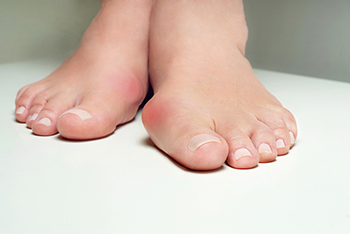
Bunions are a common foot deformity. They are easy to notice by the large, bony protrusion that forms on the side of the big toe. An additional complication that can happen from a bunion can include calluses that form as a result of the bunion hitting the side or top of the shoe. Large bunions may cause the other toes to shift toward each other, and bigger shoes may have to be purchased. Bunions are caused by genetic reasons, or from wearing shoes that do not have adequate room for the toes to move freely in. Bunions can be unsightly, and there are prevention methods that can reduce the risk of getting a bunion. These can include wearing shoes that fit correctly and minimizing stress that is put on the feet. If you have a bunion, a podiatrist can offer you effective treatment methods, and it is strongly suggested that you confer with this type of doctor who can help you to manage this condition.
If you are suffering from bunion pain, contact Jim Maxka, DPM of South Penn Foot & Ankle Associates. Our doctor can provide the care you need to keep you pain-free and on your feet.
What Is a Bunion?
Bunions are painful bony bumps that usually develop on the inside of the foot at the joint of the big toe. As the deformity increases over time, it may become painful to walk and wear shoes. Women are more likely to exacerbate existing bunions since they often wear tight, narrow shoes that shift their toes together. Bunion pain can be relieved by wearing wider shoes with enough room for the toes.
Causes
- Genetics – some people inherit feet that are more prone to bunion development
- Inflammatory Conditions - rheumatoid arthritis and polio may cause bunion development
Symptoms
- Redness and inflammation
- Pain and tenderness
- Callus or corns on the bump
- Restricted motion in the big toe
In order to diagnose your bunion, your podiatrist may ask about your medical history, symptoms, and general health. Your doctor might also order an x-ray to take a closer look at your feet. Nonsurgical treatment options include orthotics, padding, icing, changes in footwear, and medication. If nonsurgical treatments don’t alleviate your bunion pain, surgery may be necessary.
If you have any questions, please feel free to contact our office located in Hanover, PA . We offer the newest diagnostic and treatment technologies for all your foot care needs.
